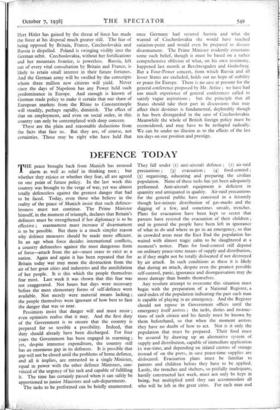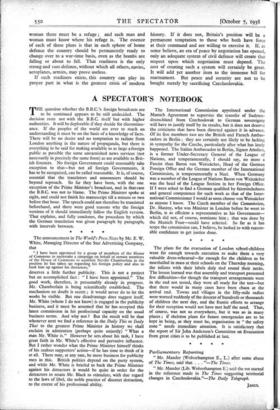DEFENCE TODAY
THE peace brought back from Munich has aroused alarm as well as relief in thinking men ; but whether they rejoice or whether they fear, all are agreed on one point of future policy. In the last week this country was brought to the verge of war, yet was almost totally defenceless against the greatest danger that had to be faced. Today, even those who believe in the reality of the peace of Munich insist that such defence- lessness must not continue. The Prime Minister himself, in the moment of triumph, declares that Britain's defences must be strengthened if her diplomacy is to be effective ; rearmament must increase if disarmament is to be possible. But there is a much simpler reason why defence measures should be made more efficient. In an age when force decides international conflicts, a country defenceless against the most dangerous form of force—attack from the air—must cease to exist as a nation. Again and again it has been repeated that for Britain today war may mean the destruction from the air of her great cities and industries and the annihilation of her people. It is this which the people themselves fear most. Last week it was shown that this fear was not exaggerated. Not hours but days were necessary before the most elementary forms of self-defence were available. Not merely were material means lacking ; the people themselves were ignorant of how best to face the danger that was so near.
Pessimists insist that danger will and must recur ; even optimists realise that it may. And the first duty of the Government is to ensure that the country is prepared for so terrible a possibility. Indeed, that duty should already have been discharged. For four years the Government has been engaged in rearming ; yet, despite immense expenditure, the country still has an enormous gap in its defences. It is possible that gap will not be closed until the problems of home defence, and all it implies, are entrusted to a single Minister, equal in power with the other defence Ministers, con- vinced of the urgency of his task and capable of fulfilling it. The time has certainly passed when it can safely be apportioned to junior Ministers and sub-departments.
The tasks to be performed can be briefly enumerated. They fall under (t) anti-aircraft defence ; (2) air-raid precautions ; (3) evacuation ; (4) food-control ; (5) organising, educating and preparing the civilian population. None of these tasks has yet been adequately performed. Anti-aircraft equipment is deficient in quantity and antiquated in quality. Air-raid precautions for the general public have consisted in a leisurely though last-minute distribution of gas-masks and the digging of a few, and sometimes unsafe, trenches. Plans for evacuation have been kept so secret that parents have resisted the evacuation of their children ; and in general the people have been left in ignorance of what to do and where to go in an emergency, so that in crowded areas near the East End the population has waited with almost tragic calm to be slaughtered at a moment's notice. Plans for food-control still depend on ordinary peace-time means of supply and distribution, as if they might not be totally dislocated if not destroyed by air attack. In such conditions as these it is likely that during an attack, despite even the greatest possible self-control, panic, ignorance and disorganisation may do more damage than bombs themselves.
Any resolute attempt to overcome this situation must begin with the preparation of a National Register, a card-index of the population indicating the part each man is capable of playing in an emergency. And the Register should not repose in Government offices until the emergency itself arrives ; the tasks, duties and instruc- tions of each citizen and his family must be known by them beforehand, so that when the moment arrives they have no doubt of how to act. Nor is it only the population that must be prepared. Their food must be assured by drawing up an alternative system of supply and distribution, capable of immediate application in war-time, and depending on inland centres of storage instead of on the ports, in case peace-time supplies are dislocated. Evacuation plans must be familiar to parents and children before they have to be applied. Lastly, the trenches and shelters, so pitifully inadequate, hastily constructed last week, must not only be kept in being, but multiplied until they can accommodate all who will be left in the great cities. For each man and woman there must be a refuge ; and each man and woman must know where his refuge is. The essence of each of these plans is that in each sphere of home defence the country should be permanently ready to change over to a war-time basis, even as the bombs are falling or about to fall. That readiness is the only strong and sure defence, without which all others, navies, aeroplanes, armies, may prove useless.
If such readiness exists, this country can play its proper part in what is the greatest crisis of modern history. If it does not, Britain's position will be a permanent temptation to those who both have force at their command and are willing to exercise it. If, as some believe, an era of peace by negotiation has opened, only an adequate system of civil defence will create that respect upon which negotiation must depend. The cost of creating such a system will certainly be great. It will add yet another item to the immense bill for rearmament. But peace and security are not to be bought merely by sacrificing Czechoslovakia.















































 Previous page
Previous page